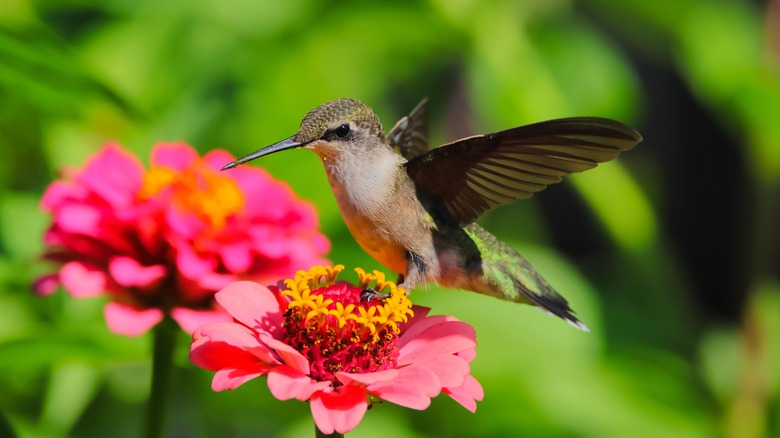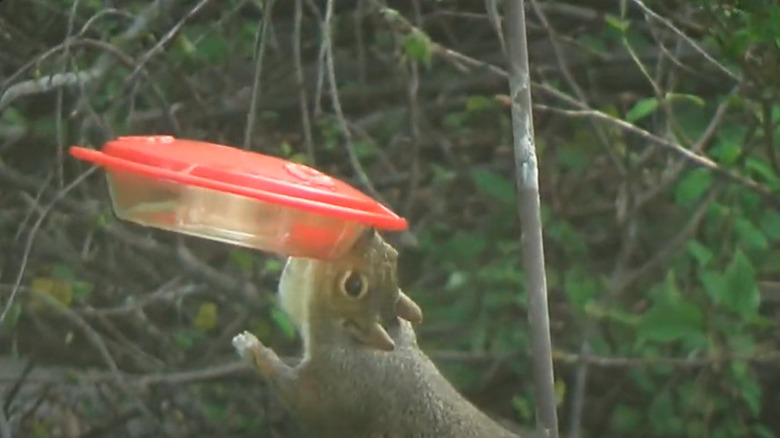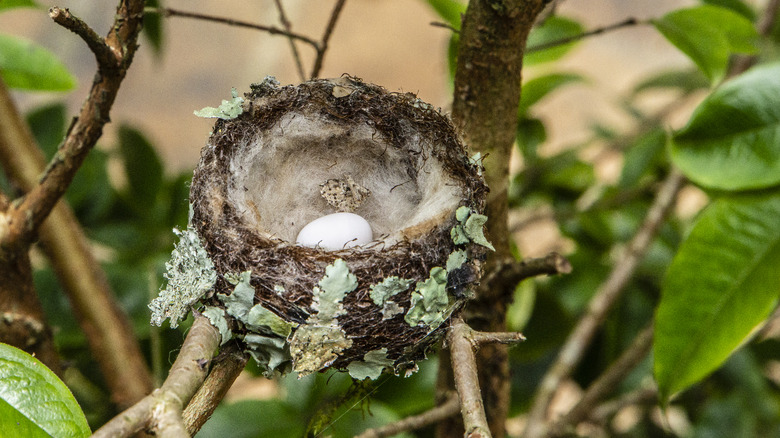How To Save Hummingbirds From These Common Yard Pests
No matter the genius tips and tricks to attract more hummingbirds to your garden you employ, if you don't take steps to protect these teeny gem-winged visitors from predators, your efforts may be in vain. Everything from other birds to spiders and praying mantises prey on hummers, as do critters of the mammalian variety. If presented with the opportunity, squirrels and chipmunks will raid hummingbird nests for the eggs and chicks, sip nectar from feeders, and even grab unlucky hummers mid-air. Planting dense shrubs and flowering plants, keeping hummer feeders well-stocked, reducing the chance of window strikes, and even feeding squirrels and chipmunks during nesting season can all help keep hummingbirds safe.
Despite most people thinking squirrels and chipmunks are vegan, chowing down on nuts, seeds, and other plant-based treats, they're actually omnivorous. If they come across a vulnerable bird's nest, that is, one full of eggs or helpless chicks, and the adult bird is missing, they won't hesitate to wolf them down. Sure, it's not a consistent or premeditated activity — a 1993 article in Great Basin Naturalist notes they only do this in emergencies when other preferred food sources are scarce — but it definitely happens. If they come across them on their travels through the forest, they'll eat them. Squirrels also compete with cavity-nesting birds for nest sites. It's unlikely, however, that they're competing with hummingbirds, since their nests are so tiny and thus constructed on flimsy branches. How, then, do squirrels and chipmunks negatively interact with wee hummers, specifically?
What dangers do squirrels and chipmunks pose to hummingbirds?
Anecdotally and in research, squirrels and chipmunks have been documented sitting in trees near hummingbird feeders and snatching juvenile and adult hummers from the air. Fox squirrels (Sciurus niger) are among the most raptorial of U.S. squirrel species; they purposefully prey on live birds. However, it's widely considered a rare occurrence. As we mention in the section above, nest predation is a different story. It's common knowledge among bird experts that squirrels and chipmunks eat hummer eggs and snatch chicks — alive or dead. These fluff-tailed critters can climb trees, after all, making it relatively easy for them to find and reach nests.
Squirrels, in particular, have also been spotted slurping sugar water from hummingbird feeders. In an admittedly adorable 2015 video by backyard birder and YouTuber David Ramsey, a squirrel attempts various ways to get to the nectar inside a feeder, including reaching up and tipping the contraption downwards and scaling the mounting pole. Fruit is a regular and natural part of a squirrel or chipmunk's diet; they definitely have a sweet tooth. The question, "How do I stop squirrels from drinking the nectar in my hummingbird feeders?" has been asked numerous times on homeowner and pet care forums over the years, too. Sadly, birds, including hummers, are prone to flying into windows and falling, stunned or worse, to the ground. These wiley rodents have also been known to grab injured hummers and other birds for a meal.
How to protect hummingbirds from predation by squirrels and chipmunks
Squirrels and chipmunks will happily take advantage of any easy-to-procure meal. A 2003 study by the British Trust for Ornithology reveals hummingbird brooding behavior sits within a few important at-risk criteria for squirrel (specifically gray squirrel) predation. They sometimes nest in sparsely leafed trees, places with lots of squirrels or songbirds, or set up house in poorly resourced areas. Having to travel long distances for food leaves adult hummers with little time and energy for defense.
Reduce risk in your garden by growing low, dense shrubs and plants with nectar-filled blooms. Keep nectar feeders well stocked, and install a raccoon baffle to stop any squirrel acrobatics. Rodents with full bellies and an abundance of preferred food are unlikely to target agile prey like hummingbirds. Set up squirrel feeders during hummingbird nesting season — March through November, depending on your area — to draw their focus away from eggs. To reduce the chance of window strikes, hang a hummingbird feeder near your window, no more than 3 feet away.
You might, however, not have to do anything at all. Hummingbirds are experts at camouflage; the lichen, spiderwebs, moss, and leaves they use for construction mean hummingbird nests are hard to spot. Plus, the branches they construct their teeny nests on are spindly, providing little purchase for a hefty squirrel or chipmunk. Other evidence suggests feisty hummers don't give up nectar easily and will dive-bomb chipmunks and squirrels at feeders to deter them.


